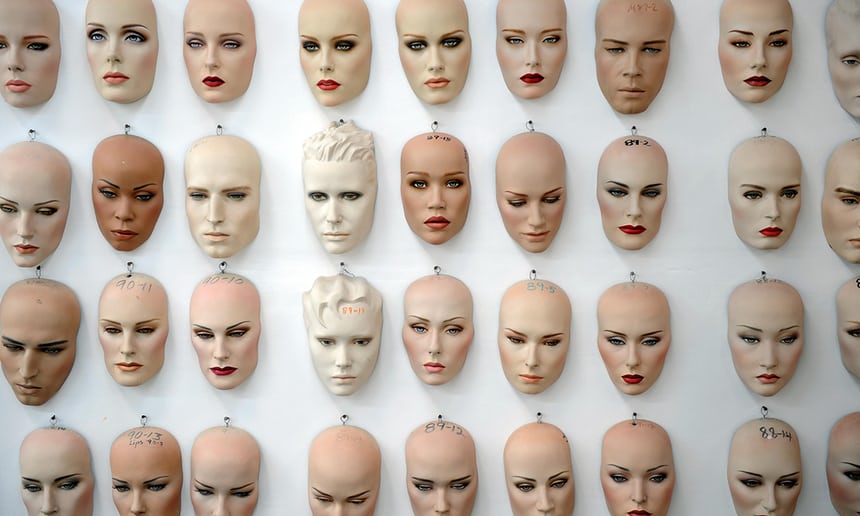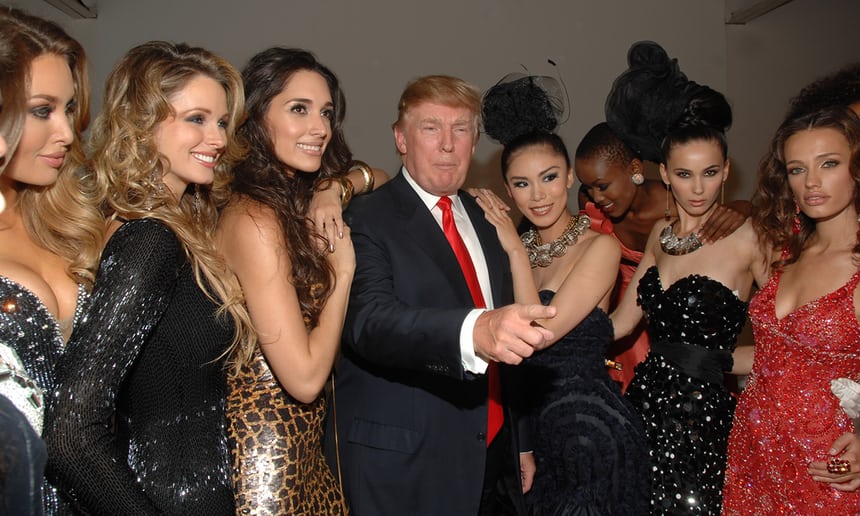A Broken Idea of Sex Is Flourishing – Blame Capitalism
SEXUALITIES, 14 May 2018
In this world, women are marketed as toys and trophies. Are we surprised when some men take things literally?

‘Feminism and capitalism are at odds, if under the one women are people and under the other they are property.’
Photograph: Gabriel Bouys/AFP/Getty Images
12 May 2018 – Since the Toronto bloodbath, a lot of pundits have belatedly awoken to the existence of the “incel” (short for involuntary celibate) online subculture and much has been said about it. Too often, it has been treated as some alien, unfamiliar worldview. It’s really just an extreme version of sex under capitalism we’re all familiar with because it’s all around us in everything, everywhere and has been for a very long time. And maybe the problem with sex is capitalism.
What’s at the bottom of the incel worldview: sex is a commodity, accumulation of this commodity enhances a man’s status, and every man has a right to accumulation, but women are in some mysterious way obstacles to this, and they are therefore the enemy as well as the commodity. They want high-status women, are furious at their own low status, but don’t question the system that allocates status and commodifies us all in ways that are painful and dehumanizing.
Entitlement too plays a role: if you don’t think you’re entitled to sex, you might feel sad or lonely or blue, but not enraged at the people who you think owe you. It’s been noted that some of these men are mentally ill and/or socially marginal, but that seems to make them only more susceptible to online rage and a conventional story taken to extremes. That is, it doesn’t cause this worldview, as this worldview is widespread.
Rather, it makes them vulnerable to it; the worldview gives form or direction to that isolation and incapacity. Many of the rest of us have some degree of immunity, thanks to our access to counter-narratives and to loving contact with other human beings, but we are all impacted by this idea that everyone has a market value and this world in which so many of us are marketed as toys and trophies.
Feminism and capitalism are at odds, if under the one women are people and under the other they are property.
If you regard women as people endowed with certain inalienable rights, then heterosexual sex – as distinct from rape – has to be something two people do together because both of them want to, but this notion of women as people is apparently baffling or objectionable to hordes of men – not just incels.
Women-as-bodies are sex waiting to happen – to men – and women-as-people are annoying gatekeepers getting between men and female bodies, which is why there’s a ton of advice about how to trick or overwhelm the gatekeeper. Not just on incel and pick-up-artist online forums but as jokey stuff in movies. You could go back to Les Liaisons Dangereuses and Casanova’s trophy-taking, too.
It goes back before capitalism, really, this dehumanization that makes sex an activity men exact from women who have no say in the situation. The Trojan war begins when Trojan Paris kidnaps Helen and keeps her as a sex slave. During the war to get Helen back, Achilles captures Queen Briseis and keeps her as a sex slave after slaying her husband and brothers (and slaying someone’s whole family is generally pretty anti-aphrodisiac). His comrade in arms Agamemnon has some sex slaves of his own, including the prophetess Cassandra, cursed by Apollo for refusing to have sex with him. Read from the point of view of the women, the Trojan wars resemble Isis among the Yazidi.
Feminism and capitalism are at odds, if under the one women are people and under the other they are property. Despite half a century of feminist reform and revolution, sex is still often understood through the models capitalism provides. Sex is a transaction; men’s status is enhanced by racking up transactions, as though they were poker chips.
Which is why the basketball star Wilt Chamberlain boasted that he’d had sex with 20,000 women in his 1991 memoir (prompting some to do the math: that would be about 1.4 women per day for 40 years). Talk about primitive accumulation! The president of the United States is someone who has regularly attempted to enhance his status by association with commodified women, and his denigration of other women for not fitting the Playmate/Miss Universe template is also well-known. This is not marginal; it’s central to our culture, and now it’s embodied by the president of our country.
Women’s status is ambiguous in relation to sexual experience, or perhaps it’s just wrecked either way: there’s that famous scene in The Breakfast Club in which a female character exclaims, “Well, if you say you haven’t, you’re a prude. If you say you have then you’re a slut. It’s a trap.” Reminiscing about these 1980s teen movies she starred in, Molly Ringwald recently recalled: “It took even longer for me to fully comprehend the scene late in Sixteen Candles, when the dreamboat, Jake, essentially trades his drunk girlfriend, Caroline, to the Geek, to satisfy the latter’s sexual urges, in return for Samantha’s underwear.” The Geek has sex with her while she’s unable to consent, which we now call rape and then called a charming coming-of-age movie.
Under capitalism, sex might as well be with dead objects, not live collaborators
This idea of sex as something men get, often by bullying, badgering, tricking, assaulting, or drugging women is found everywhere. The same week as the Toronto van rampage, Bill Cosby was belatedly found guilty of one of the more than 60 sexual assaults that women have reported. He was accused of giving them pills to render them unconscious or unable to resist. Who wants to have sex with someone who isn’t there? A lot of men, apparently, since date rape drugs are a thing, and so are fraternity-house techniques to get underage women to drink themselves into oblivion, and Brock Turner, known as the Stanford rapist, assaulted a woman who was blotted out by alcohol, inert and unable to resist.
Under capitalism, sex might as well be with dead objects, not live collaborators. It is not imagined as something two people do that might be affectionate and playful and collaborative – which casual sex can also be, by the way – but that one person gets. The other person is sometimes hardly recognized as a person. It’s a lonely version of sex. Incels are heterosexual men who see this mechanistic, transactional sex from afar and want it at the same time they rage at people who have it.
That women might not want to grow intimate with people who hate them and might want to harm them seems not to have occurred to them as a factor, since they seem bereft of empathy, the capacity to imaginatively enter into what another person is feeling. It hasn’t occurred to a lot of other men either, since shortly after an incel in Toronto was accused of being a mass murderer the sympathy started to pour out for him.
At the New York Times, Ross Douthat credited a libertarian with this notion: “If we are concerned about the just distribution of property and money, why do we assume that the desire for some sort of sexual redistribution is inherently ridiculous?” Part of what’s insane here is that neither the conservative Douthat nor libertarians are at all concerned with the just distribution of property and money, which is often referred to as socialism. Until the property is women, apparently. And then they’re happy to contemplate a redistribution that seems to have no more interest in what women want than the warlords dividing up the sex slaves in the Trojan war.
Happily someone much smarter took this on before Toronto. In late March, at the London Review of Books, Amia Srinivasan wrote: “It is striking, though unsurprising, that while men tend to respond to sexual marginalisation with a sense of entitlement to women’s bodies, women who experience sexual marginalisation typically respond with talk not of entitlement but empowerment. Or, insofar as they do speak of entitlement, it is entitlement to respect, not to other people’s bodies.”
That is, these women who are deemed undesirable question the hierarchy that allots status and sexualization to certain kinds of bodies and denies it to others. They ask that we consider redistributing our values and attention and perhaps even desires. They ask everyone to be kinder and less locked into conventional ideas of who makes a good commodity. They ask us to be less capitalistic.
What’s terrifying about incel men is that they seem to think the problem is that they lack sex when, really, what they lack is empathy and compassion and the imagination that goes with those capacities. That’s something money can’t buy and capitalism won’t teach you. The people you love might, but first you have to love them.
______________________________________________
Rebecca Solnit is a freelance columnist and the author of Men Explain Things to Me.
Go to Original – theguardian.com
DISCLAIMER: The statements, views and opinions expressed in pieces republished here are solely those of the authors and do not necessarily represent those of TMS. In accordance with title 17 U.S.C. section 107, this material is distributed without profit to those who have expressed a prior interest in receiving the included information for research and educational purposes. TMS has no affiliation whatsoever with the originator of this article nor is TMS endorsed or sponsored by the originator. “GO TO ORIGINAL” links are provided as a convenience to our readers and allow for verification of authenticity. However, as originating pages are often updated by their originating host sites, the versions posted may not match the versions our readers view when clicking the “GO TO ORIGINAL” links. This site contains copyrighted material the use of which has not always been specifically authorized by the copyright owner. We are making such material available in our efforts to advance understanding of environmental, political, human rights, economic, democracy, scientific, and social justice issues, etc. We believe this constitutes a ‘fair use’ of any such copyrighted material as provided for in section 107 of the US Copyright Law. In accordance with Title 17 U.S.C. Section 107, the material on this site is distributed without profit to those who have expressed a prior interest in receiving the included information for research and educational purposes. For more information go to: http://www.law.cornell.edu/uscode/17/107.shtml. If you wish to use copyrighted material from this site for purposes of your own that go beyond ‘fair use’, you must obtain permission from the copyright owner.

